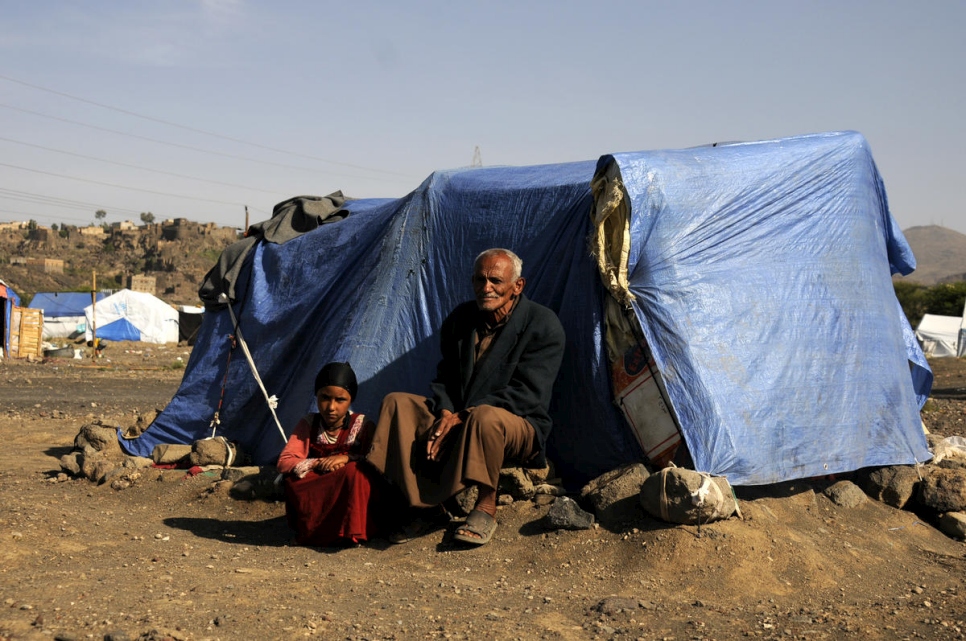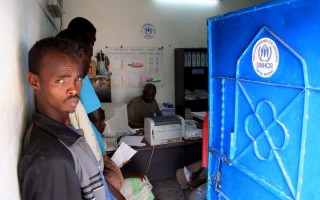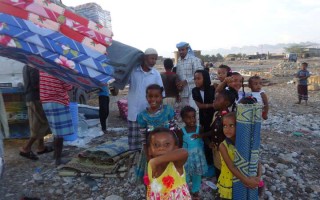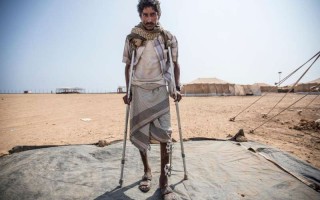
A displaced Yemeni family sit outside their tent at the Dharawan settlement, Sana’a, Yemen, May 2017, © UNHCR/Mohammed Hamoud
This is a summary of what was said by UNHCR spokesperson Andrej Mahecic – to whom quoted text may be attributed – at today’s press briefing at the Palais des Nations in Geneva.
Amid rapidly deteriorating humanitarian crisis in Yemen, UNHCR, the UN Refugee Agency, has stepped up its efforts to ensure that tens of thousands of displaced Yemenis have immediate access to cash support. In a country where three out of four Yemenis require some form of aid and protection and where food and fuel prices have increased by 25 and 45 per cent respectively this year alone, this assistance is a life-line for the most vulnerable families, helping them to meet their urgent needs while in displacement.
Current pre-famine conditions and cholera outbreak in Yemen come on top of the disastrous impact the conflict has had so far – massive displacement and mounting civilian casualties. Therefore, it remains vital that the critical life-saving activities – including protection and emergency shelter – are addressed and supported in parallel with food, health and education programmes.
During October alone, UNHCR cash-interventions have reached more than 22,000 vulnerable families
More than two thirds of an estimated 2.7 million internally displaced people (IDPs) have been living in displacement for more than two years. Many of them fled to safer parts of the country and have by now depleted all their resources. In order to meet their immediate needs and strengthen their resilience, UNHCR is providing cash assistance to the most vulnerable families.
During October alone, UNHCR cash-interventions have reached more than 22,000 vulnerable families (approximately 150,000 people) across 14 of the worst affect hosting governorates. Families benefitting from this assistance have either fled fighting to areas of perceived safety, returned to their homes after internal displacement, often finding their homes damaged or destroyed. Many of vulnerable communities hosting IDPs are also struggling to survive.
The funds are released based on an in-depth household assessments by UNHCR’s partners operating across the country, often in hard to reach areas. Selected families receive cash to cover their immediate protection needs, for example life-saving medical treatments or subsidies that help families avoid evictions and secure a roof over their heads. This assistance is befitting the local economy, as families buy essential goods in local stores and pay for services.
Cash assistance is the most cost-efficient way to offer a flexible and dignified form of support.
UNHCR is working with Al-Amal bank to distribute cash directly through a so-called Hawala system which is operational and reliable despite the conflict in Yemen. After assessment, an SMS message notifies families about their entitlements. They can then proceed to collect their assistance from any of the bank’s agents across the country. This allows UNHCR to provide assistance to families in hard to reach and remote areas. Cash assistance is the most cost-efficient way to offer a flexible and dignified form of support. Those benefiting say it helps them to avoid resorting to desperate coping mechanisms, such as child labour and forced marriages. UNHCR and its partners also provide protection services such as psychosocial counselling and legal assistance, as well as distribution of basic aid items for vulnerable IDPs.
Given the increasingly protracted nature of the humanitarian crisis, as well as the dire economic situation in Yemen, UNHCR cash assistance is a life-line for many families. So far in 2018 UNHCR has distributed almost US $33 million cash assistance. We aim to distribute a total of more than US$41 million before the end of the year. In total, 700,000 IDPs, returnees and conflict-affected host communities and another 130,000 refugees and asylum seekers across Yemen will benefit from this assistance in 2018.
For more information on this topic, please contact:
- In Amman, Rula Amin, aminr@unhcr.org, +962 (0)790 04 58 49
- In Geneva, Andrej Mahecic, mahecic@unhcr.org, +41 79 642 97 09
Originally published by UNHCR on 26, October 2018



